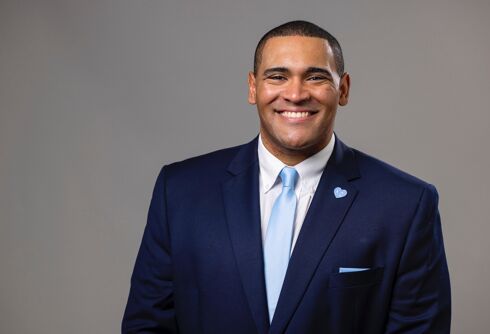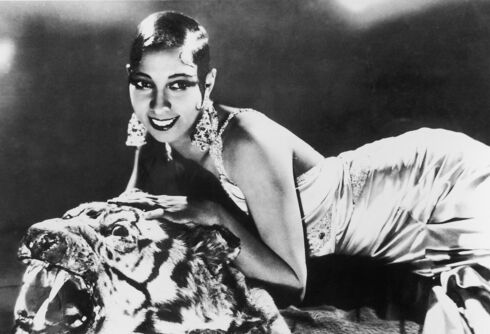It has been 60 years since Rev. Dr. Martin Luther King Jr. delivered his famous “I Have A Dream” speech on the steps of The Lincoln Memorial at The March on Washington for Jobs and Freedom. Today, history reflects this moment as intended — a turning point in the fight for racial and economic justice and the catalyst for the passage of the Civil Rights Act of 1964.
But for decades, gay strategist and King advisor Bayard Rustin has remained a footnote in the retelling of this historic day. Rustin was the lead organizer behind the march, yet his legacy has long remained trapped within the privileged halls of academia and has come dangerously close to complete erasure.
Related:
I wasn’t always proud to be a Black queer man. But one heart-wrenching moment changed everything.
After years of struggle, I now advocate for LGBTQ+ rights across the country. Here’s what it took for me to get there.
The undermining of Rustin’s legacy and the blatant disregard for the influential principles of nonviolence he introduced to King was by design. For decades, activists agreed to cast Rustin as an extra instead of a leading player due to his sexuality amidst internal fears of damage to the Civil Rights movement.
Never Miss a Beat
Subscribe to our newsletter to stay ahead of the latest LGBTQ+ political news and insights.
Unsurprisingly, many people only became aware of Rustin as a civil rights icon after the 2023 release of the Netflix biopic bearing his last name.
The burden of split identities
“On the day that I was born Black, I was also born a homosexual. They either believe in freedom and justice for all, or they do not.”- Colman Domingo as Bayard Rustin in “Rustin”
While vastly different than when Rustin lived, the Black LGBTQ+ experience in America today remains hindered by a rigid white Judeo-Christian patriarchal standard that excludes deviations and those who represent that perceived “deviance.”
Black LGBTQ+ people are often forced to endure a splitting of identities – focusing exclusively on either their Blackness or their queerness, depending on the day and the cause.
But Black LGBTQ+ people don’t have the luxury of choosing a singular fight, and like Rustin, they have been on the front lines fighting for the freedom and liberation of all Black people, usually to be met with homophobia in Black spaces and racism in white spaces.
Rustin endured this reality, often forced into supporting roles in the movement despite frequently being the most brilliant strategist in the room. And how did history repay him for organizing the most monumental Civil Rights demonstration of the 20th Century? By nearly forgetting him.
Homophobia has shaped entire narratives about prolific Civil Rights figures like Rustin, James Baldwin, Lorraine Hansberry, and Norris Herndon. Refusing to acknowledge they were not heterosexual reduces the full context of their lives and talents.
Herndon, an heir to the multi-million dollar Atlanta Life Insurance Company, preferred the isolation of the family’s West End Atlanta mansion versus public Civil Rights events.
“With a father who insisted upon a straight and narrow course and in an early 20th-century society that had no tolerance for what it considered deviant, Norris would have to deny himself. He would assume a compromised selfhood, his sexuality arrested, denied, or expressed in secret,” wrote historian Carole Merritt in her 2002 biography, The Herndons: An Atlanta Family.
Despite his isolated life, Herndon quietly used his wealth to significantly advance racial equality. He regularly sent checks to support the Southern Christian Leadership Conference, NAACP, and other groups leading the Civil Rights Movement.
Rustin’s bombastic, public position as an out gay organizer was an experience as foreign to the reclusive Herndon as the true history of the movement is to those who still insist it was led by a homogenous cishet group of revolutionaries. They both played major roles in different ways, and yet both were relegated to footnotes because they were gay.
Revisionist history would have one believe that Black LGBTQ+ bodies were not swinging from trees in the Mississippi Delta, did not feel the blunt force of the police officer’s billy club on Bloody Sunday in Selma, or did not feel the vicious bites of attack dogs on the streets of Birmingham. They’d have you believe that Black LGBTQ+ people emerged yesterday with an “agenda” that doesn’t include the freedom and liberation of all Black people. Black LGBTQ+ people have always been here. We are not the enemy. But the impact of white supremacist structural violence in our community continues to be.
Telling our stories
“I can’t surrender my differences. The world won’t let me. Even if I could, I wouldn’t.”- Colman Domingo as Bayard Rustin in “Rustin”
Memories fade, and personal biases shape how or if stories of Black historical figures are passed from one generation to the next.
But films live forever.
I imagine fifty years from now, some young queer person of color will stumble upon Rustin – a film directed by a Black gay man (George C. Wolfe), starring an Oscar-nominated Afro-Latino gay man, produced by the first Black President (Barack Obama) who was also the first to publicly support marriage equality – and see a piece of themselves reflected on screen. I hope that person realizes that we, as Black LGBTQ+ people, stand on the shoulders of giants. Rustin was nearly forgotten, but his legacy is now immortalized on screen forever.
Darian Aaron is an award-winning journalist. He is currently the Director of Local News: US South at GLAAD, where he develops original content about LGBTQ people of color and people living with HIV in the South. Darian is the former Editor-At-Large of The Reckoning and Editor of The Georgia Voice. He is a proud alum of Alabama State University. Follow him @darianoutloud on all social platforms.
Don't forget to share:















